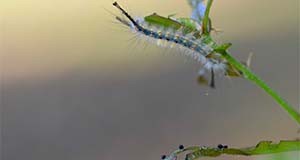Abstract
Every landscape manager has a pest management toolbox, which contains tools that represent different management strategies. People can be quick to use pesticides, but an integrated approach using multiple tools can be much safer, have longer lasting beneficial effects, and in some cases cut costs. This revised 5-page fact sheet will help Extension agents and specialists, lawn and landscape managers, Florida Master Gardeners, and homeowners develop long-term sustainable pest management programs using an Integrated Pest Management (IPM) framework. Written by Eileen Buss and Adam G. Dale, and published by the Department of Entomology and Nematology, April 2016.
ENY-298/IN109: Landscape Integrated Pest Management (ufl.edu)
References
Bottrell, D. G. 1979. Integrated Pest Management. U.S. Government Printing Office.
Buss, E.A. and Park Brown, S.G. 2014. Natural Products for Managing Landscape and Garden Pests in Florida. ENY-350. Gainesville: University of Florida Institute of Food and Agricultural Sciences. http://edis.ifas.ufl.edu/in197
Cherry, R. and R. Nagata. 2005. "Development of resistance in Southern Chinch Bugs (Hemiptera: Lygaeidae) to the insecticide Bifenthrin." The Florida Entomologist 88:219-221. https://doi.org/10.1653/0015-4040(2005)088[0219:DORISC]2.0.CO;2
Coffelt, M. A. and P. B. Schultz. 1993. "Quantification of an aesthetic injury level and threshold for an urban pest management program against orangestriped oakworm (Lepidoptera: Saturniidae)." Journal of Economic Entomology 86:1512-1515. https://doi.org/10.1093/jee/86.5.1512
Dale, A. G., and S. D. Frank. 2013. Take arms against armored scale. Nursery Management. GIE Media, Inc.
Frank, S. D. and C. S. Sadof. 2011. "Reducing Insecticide Volume and Nontarget Effects of Ambrosia Beetle Management in Nurseries." Journal of Economic Entomology 104:1960-1968. https://doi.org/10.1603/EC11124
Koricheva, J., S. Larsson, and E. Haukioja. 1998. "Insect performance on experimentally stressed woody plants: A meta-analysis." Annual Review of Entomology 43:195-216. https://doi.org/10.1146/annurev.ento.43.1.195
Landis, D. A., S. D. Wratten, and G. M. Gurr. 2000. "Habitat management to conserve natural enemies of arthropod pests in agriculture." Annual Review of Entomology 45:175-201. https://doi.org/10.1146/annurev.ento.45.1.175
Larson, J. L., C.T. Redmond, and D.A. Potter. 2013. "Assessing insecticide hazard to bumble bees foraging on flowering weeds in treated lawns." PLoS ONE 8(6): e66375. doi: 10.1371/journal.pone.0066375. https://doi.org/10.1371/journal.pone.0066375
LeBeck, L. M. and N.C. Leppla. 2015. Guidelines for purchasing and using commercial natural enemies and biopesticides in North America. IPM-146. Gainesville: University of Florida Institute of Food and Agricultural Sciences. http://edis.ifas.ufl.edu/in849
Pedigo, L. P., S. H. Hutchins, and L. G. Higley. 1986. "Economic injury levels in theory and practice." Annual Review of Entomology 31:341-368. https://doi.org/10.1146/annurev.en.31.010186.002013
Potter, D. A., A. J. Powell, P. G. Spicer, and D. W. Williams. 1996. "Cultrual practices affect root-feeding white grubs (Coleoptera: Scarabaeidae) in turfgrass." Journal of Economic Entomology 89:156-164. https://doi.org/10.1093/jee/89.1.156
Raupp, M. J., C. S. Koehler, and J. A. Davidson. 1992. "Advances in implementing integrated pest management for woody landscape plants." Annual Review of Entomology 37:561-585. https://doi.org/10.1146/annurev.en.37.010192.003021
Szczepaniec, A., S. F. Creary, K. L. Laskowski, J. P. Nyrop, and M. J. Raupp. 2011. "Neonicotinoid insecticide imidacloprid causes outbreaks of spider mites on elm trees in urban landscapes." PLoS One 6:e20018. https://doi.org/10.1371/journal.pone.0020018
White, T. C. R. 1984. "The abundance of invertebrate herbivores in relation to the availability of nitrogen in stressed food plants." Oecologia 63:90-105. https://doi.org/10.1007/BF00379790
Williamson, R. C. and D.A. Potter. 1997. "Oviposition of black cutworm (Lepidoptera: Noctuidae) on creeping bentgrass putting greens and removal of eggs by mowing." Journal of Economic Entomology 90(2): 590-594. https://doi.org/10.1093/jee/90.2.590

